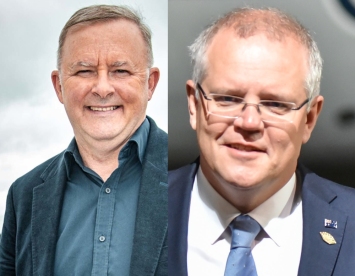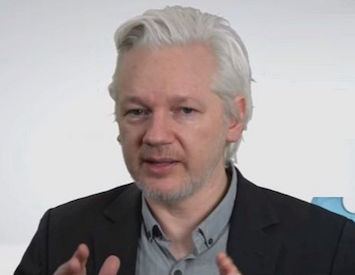Turnbull continues to be wedded to 1950s foreign policy despite the U.S., to whom blind obeisance is paid, suddenly shifting 180 degrees in orientation with Trump’s election victory, writes James O'Neill.
AFTER DONALD TRUMP was confirmed as the President-elect of the United States, Malcolm Turnbull was quickly on the telephone to congratulate him.
We only have Turnbull’s version of what was said to our “intimate” friend but some things have become clear in the light of what Turnbull claims to have said after subsequent comments from both Australian and American sources.
The aspect that is the subject of this comment however, is Turnbull and Trump’s attitude to the Trans Pacific Partnership (TPP). It is commonly – and misleadingly – referred to as a trade deal. It is no such thing. Only seven of its 29 chapters dealt with trade. It was negotiated in secret and many of its provisions are still shrouded in uncertainty.
The mainstream media has continued to obscure the details. In particular, it has glided over the dispute resolution procedures, which amount to the most sustained attack upon our national sovereignty and independent legal structure in living memory.
The TPP exists for two principal reasons: to reinforce American corporate power; and to provide a crucial component of the United States' attempts to “contain” China — itself the central element in the so-called “pivot to Asia” that was a centerpiece of the Obama-Clinton administration.
A major “trade” deal that excluded the region’s largest trading nation is a clue as to its real intentions.
The ascension of Donald Trump, an avowed anti-TPP exponent, has understandably sent panic through the ranks of the Liberal Party and their acolytes. How does one respond when the nation to whom blind obeisance is paid, suddenly shifts 180 degrees in orientation? There is similar panic in response to Trump’s overtures to Russia.
We have now been told that Turnbull’s telephone call to Trump included a plea that the TPP not be abandoned. Whether or not Trump will actually carry out his pre-election pledges on this matter, as on so much else, only time will tell. In the meantime, the world of international trade and its associated financial restructuring moves on.
Malcolm Turnbull hopeful Donald Trump will change his mind on free trade https://t.co/VEv8DNeZA7 #auspol #NO TPP
— AussieGirl (@Nonamebugga) November 20, 2016
There are a number of important developments in this context in our region that are worth noting. First and foremost of these is the continued expansion of the Shanghai Cooperation Organisation (SCO). The SCO is central to the reassertion of Eurasia as the centre of the economic and geopolitical world. Halford Mackinder made that point more than a century ago in a prescient address to the Royal Geographical Society in London.
The SCO currently has six full members, of which China and Russia are the most significant. India and Pakistan signed memoranda of accession in June 2016 and will become full members in 2017.
There are four “observer” states, including the important states of Iran and Mongolia, both of whom will probably become full members in 2017. A further six states are “dialogue” partners, of whom the most economically and geopolitically significant is Turkey.
The BRICS (Brazil, Russia, India, China, South Africa) are longer established in economic partnership than the SCO. It will be noted that there is a degree of overlapping membership between the SCO and BRICS.
At the European end of Eurasia is the Eurasian Economic Union (EEU) with five member states, of whom the most important is Russia. The SCO and EEU have recently signed a number of agreements to coordinate and expand their economic, political and financial relationships.
Significantly, the three trading blocs are at the centre of a quiet revolution in international finance. They are among 65 countries that currently trade with China and Russia in their own currencies, thereby bypassing the U.S. dollar, which until very recently was the world’s sole reserve currency. That status has been an important reason why the U.S. has been able to defy economic gravity. As Eamonn Fingleton recently pointed out in an astute article, the changing status of the dollar is not the only reason the U.S. will struggle to remain competitive.
The overall structural framework to these rapid changes is centred on China’s massive New Silk Roads projects — the world’s largest infrastructure investment by a significant margin. The New Silk Roads, both land based and maritime, are already transforming the economic and geopolitical landscape of Eurasia and the potential dangers for Australia I have already pointed out elsewhere.
Taking part in phony "freedom of navigation" exercises or joining with the Americans, via Operation Talisman Sabre in annual naval exercises blocking the Straits of Malacca, is an extended suicide note in this context.
There is, however, a ray of hope for Australia in these developments. Partly as a counterweight to the TPP, China is the driving force behind an alternative free trade arrangement for our region.
This development is the Regional Comprehensive Economic Partnership (RCEP), launched in Phnom Penh, Cambodia, in 2012. The RCEP is a true regional free trade area. Its core is the ten members of ASEAN, plus those countries with existing free trade agreements with ASEAN members. They are Australia, China, India, Japan, Republic of Korea and New Zealand.
The RCEP accounts for half of the world’s population and incorporates the most dynamic economic powers in the world today. They are also nine of Australia’s top 12 trading partners and account for almost 60 per cent of Australia’s two-way trade, and 70 per cent of Australia’s goods and services exports.
The contrast of these developments with the TPP could not be greater. If the TPP is in fact moribund, as seems increasingly likely, Australia has an excellent opportunity to avail itself of a once in a generation review of its priorities and national interest.
Unfortunately, Prime Minister Turnbull, who only a year ago was extolling the virtues of agility, innovation and having a mature adult dialogue, has increasingly shown himself to be wedded to a 20th century Anglo-American mindset.
As even a casual observer of geopolitical and economic developments in our region can attest, that is simply no longer good enough.
Turnbull’s verbal assault on the cautious suggestions of Paul Keating and Penny Wong that now, in the light of the Trump Presidency, is an ideal time to reappraise our existing assumptions in foreign policy, does not augur well.
We have escaped the frightening prospect of a Hillary Clinton presidency, wedded as she is to perpetual war on behalf of the one per cent. It would be entirely contrary to Australia’s national interests not to take the alternative opportunities that are offered.
James O'Neill is a former academic and has practiced as a barrister since 1984. He writes on geopolitical issues, with a special emphasis on international law and human rights. He may be contacted at joneill@qldbar.asn.au.

This work is licensed under a Creative Commons Attribution-NonCommercial-NoDerivs 3.0 Australia License
Monthly Donation
Single Donation
Be informed. Subscribe to IA for just $5.









